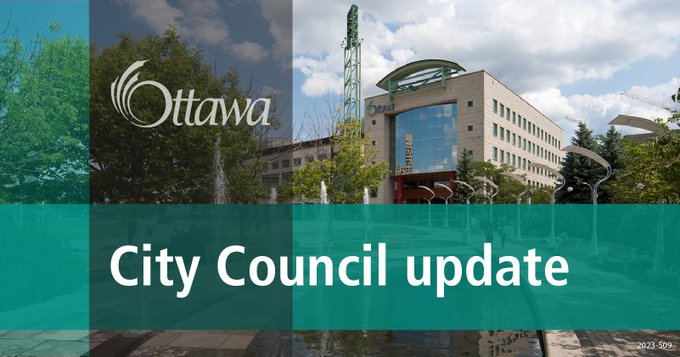On Sept. 20, the Planning and Housing Committee approved a zoning amendment(link is external) and heritage permit(link is external) to facilitate restoring and redeveloping Somerset House. The iconic Centretown building at Bank and Somerset streets partially collapsed in 2007 and remains in a deteriorated state.
Today’s approvals would permit work on the historic building, retaining and restoring original materials where possible. A storefront and windows would be reintroduced along Bank Street, based on historic evidence. The proposal also includes plans for a three-storey rear addition, with frontage on Somerset Street. The redeveloped building would contain 14 residential dwelling units and two ground-floor commercial units.
The Committee approved a zoning amendment to facilitate a development in Kanata North that promises about 2,100 new dwellings southeast of Terry Fox Drive and March Road(link is external). Multiple mixed-use, residential and commercial buildings are planned, with heights between six and 30 storeys. The concept includes plans for a new park and would support growth within the Kanata North Economic District – a major economic engine for Ottawa.
In Lincoln Fields, the Committee approved Official Plan and zoning amendments(link is external) to facilitate redevelopment of the property occupied by Parkway House – a non-profit care home for adults with physical disabilities. Three residential buildings are planned, with heights of seven, 16 and 28 storeys. Parkway House would operate within the seven-storey building and the completed development would add a total of 510 dwellings. Before proceeding, the applicant will need to determine an approach to lighting and maintaining an existing pathway that provides convenient access to Lincoln Fields Station.
The Committee approved zoning for two high-rise apartment towers and a public park northwest of Carling and Parkdale(link is external) avenues. A 16-storey tower and a 27-storey tower would add 410 dwellings to the Civic Hospital neighbourhood. The City’s Official Plan envisions high-rise buildings up to 40 storeys at locations such as this, and the buildings were designed with a low-rise base and gradual changes in height and massing to ensure the development is at least 20 metres from the nearest residential property.
A zoning amendment(link is external) and heritage permit(link is external) were also approved for a planned nine-storey apartment building on Lisgar Street, between O’Connor and Metcalfe streets. The development aims to add another 49 dwellings to Ottawa’s housing stock.
The approval of these and other recent land-use permission applications demonstrates Council remains committed to the municipal housing pledge it made in March. To help address the housing challenge, Council committed to providing home builders enough opportunities to build 151,000 quality market homes in the next ten years. The City will need to issue more than 15,000 building permits per year, but a memo(link is external) received today shows Ottawa may fall short of that target in 2023.
The City does not build homes, but by approving land-use permissions like those considered today, the Committee and Council continue to put applicants in a position to build new dwellings in all parts of Ottawa. In the second quarter of 2023, the City granted land use permissions via Official Plan and zoning amendments for 5,400 dwellings, roughly double the number granted in Q1. The City cannot force home builders to apply for building permits, however, and too few have submitted so far in 2023.
Ottawa did see more than 1,600 housing starts in Q2, on par with the first quarter, and there are now almost 14,650 dwellings underway, including 522 not-for-profit dwellings. Construction was completed on nearly 2,000 dwellings. Visit ottawa.ca/residentialdwellings for a graphic showing progress towards housing pledge targets.
Recommendations from this meeting will rise to Council on Wednesday, September 27.



